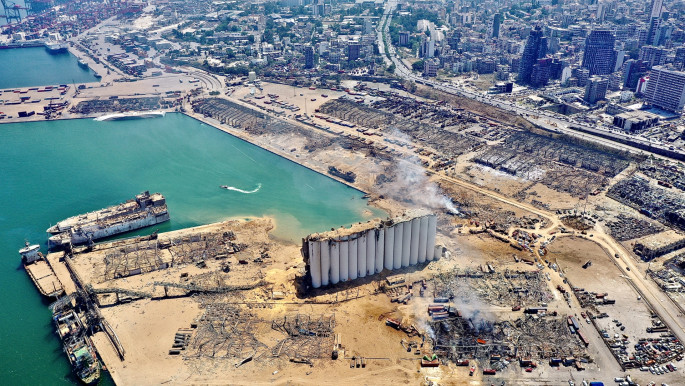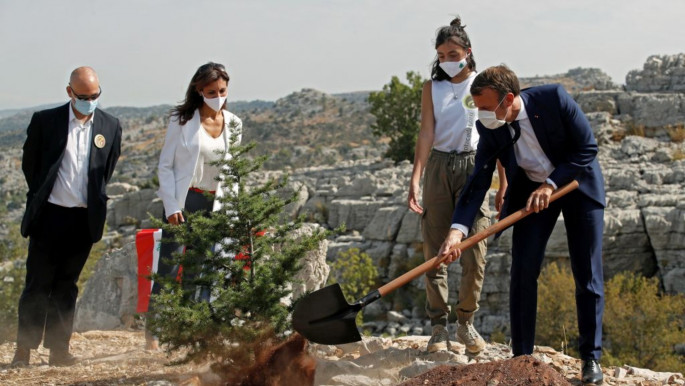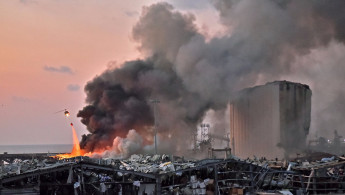Is time running out for Macron's credibility in Lebanon?
At first glance, there's a lot in the blueprint, designed by lawyer Marc Oufi and engineer Rafic Koussa, which is very similar to Macron's own plan, which collapsed recently when Lebanon's leaders failed to concede to demands placed on them by the French president.
The real difference in the Oufi-Koussa blueprint is that it breaks away from the traditional formula which the French have been overseeing for two decades.
"Macron's road map, similarly to other plans proposed either by the international community or by the Lebanese government itself," explains Rafiq, "demands institutional reforms by the Lebanese government against a reward, or bait rather, for additional public debts through the release of promised CEDRE funds".
"This demand has proven unachievable since Paris I some 20 years ago," continues Rafiq. "As the Lebanese can't afford more debts, and as they no longer enjoy the luxury of time, our plan provides for real home-grown structural changes across the board without the need for foreign indebtedness".
 |
A new blueprint, drafted by a Lebanese lawyer and engineer, sets out a number of bold reform initiatives in five key sectors |  |
Indeed, the Oufi-Koussa plan, seen by The New Arab, sets out a number of bold initiatives in five key sectors which France would be expected to manage, with French companies having the lion's share of restructuring contracts.
It also sets out how to go about repatriating stolen money which is being held in bank accounts all over the world and to tackle head on those still in power who are accused of embezzlement.
 |
|
| Read more: The geopolitical race to rebuild Beirut's port |
This latest plan, which some of Macron's officials have reportedly read and praised, might, however, be seen as salt in the wound to the French president's objectives.
Certainly, it will be hard for Macron to embrace it wholly when, ultimately, its adoption would throw a shadow over his other ventures in the region – Libya, Turkey – and might emphasis his failings. He does, after all, have a habit of biting off more than he can chew.
Could the Oufi-Koussa plan yet save his credibility and safeguard hundreds of jobs at the French energy giant Alstom, which will clean up on up to $5 billion dollars of contracts?
It seems a no-brainer. And yet Macron is not, for the moment, biting. Could it simply be that the French president sees the only way forward in Lebanon as political reform first, above all else? Others see it more as a sovereignty issue and that Lebanon should be in the driving seat of any plan, which is where his own blueprint clashes with this new one.
Marie Arena MEP, who sits on the prestigious EU foreign affairs committee in the European parliament, appears to agree. "I note France's proactive attitude" she told The New Arab. "Nevertheless, I consider that the configuration of the future Lebanese state must be defined by the Lebanese themselves".
 |
Plans that give France greater control in Lebanon's economy and clout in Beirut's political arena will reinforce this view that Macron's agenda in Lebanon is about reconnecting Paris to its past role |  |
Timing is also key. Arena, a Belgian socialist MEP, seems not to be swept away by Macron's own strategy, but is focused on the importance of a proper investigation into the Beirut port blast and emergency aid which she says is more of a priority.
"The current emergency is humanitarian and I have asked the EU to step up its technical and financial assistance to rebuild the infrastructure destroyed by the double explosion," she says. "According to the World Bank, Lebanon urgently needs $605 million to $760 million to recover," she adds.
A prominent German Green MEP however, interviewed by The New Arab, is more upbeat about the initial Macron plan. "Macron's plan linked foreign aid and support with calls for reform, including restructuring the banking sector, combating corruption, transparency of public appointments as well as reviewing the electoral law," says Hannah Neumann MEP. "The plan was ambitious, but the overall approach was right".
Both MEPs, although from different political groups, seem to support the thrust of the Oufi-Koussa plan, even though they haven't read it, in that they believe the initiative needs to come from the Lebanese.
 |
|
| Read more: Lebanon's uphill corruption battle against an 'untouchable class' |
Perhaps, if Macron doesn't take their plan seriously, the European Parliament might be the next step as a number of high-profile figures in Lebanon are already saying they would put their signature to a petition to lobby Macron or whoever shows an interest.
Most would not go on the record. But one, a former deputy PM of Lebanon whose spotless reputation sets him aside from the corrupt elite, says he supports it and highlights the point that the MEPs seem to be making, that it is really all about who foreign players want to work with on the ground: the incumbent mafia-type leaders or a new generation altogether of politicos. The genius of the Oufi-Koussa plan is that it bypasses the corrupt elite altogether.
"Indeed, I do believe that less control should be given to the politicians and more to the private sector with supervision by independent regulators," Ghassan Hasbani told The New Arab. "The role of ministers should be reduced to long term sector planning and policy making, representing the interests of their sector in the cabinet and ensuring the implementation of the law in their ministry".
And so, the compromise is there for both camps. Those like Macron who wish the existing elite to stay in place, but clean up their act, could be appeased by the radical new plan which takes away their logistical management of key sectors.
 |
Macron's plan linked foreign aid and support with calls for reform, including restructuring the banking sector, combating corruption, transparency of public appointments as well as reviewing the electoral law |  |
For those who want a clean break, the plan also accommodates them, as they will see it as a way of bypassing the old guard, rather than clashing with them head on and getting on with making crumbling, corrupt and loss-making state institutions, like the electricity operator, actually make money. The repatriation of stolen money from the state is also part of it.
Presently, their plan is sitting on the desk, at the time of writing, with France's economics and finance minister Bruno Le Maire, according to one French official who preferred not to be named. Perhaps Le Maire is taking his time simply due to wanting to wait for the outcome of the US elections first. Much emphasis is placed on Donald Trump securing a deal with Iran if he were to take a second term, which is seen in a positive light in Lebanon for many.
 |
|
| Read more: Macron's neo-colonial theatrics throw a lifeline to Lebanon's corrupt elite |
Yet, by contrast, leading geopolitical commentators believe that a Joe Biden victory would firm up US state department support for the dossier. Giorgio Cafiero, Middle East analyst and CEO and founder of Gulf State Analytics, goes further though to put Macron's Lebanon interest into a geopolitical dimension, with France's interests in the Eastern Mediterranean critical.
"Plans that give France greater control in Lebanon's economy and clout in Beirut's political arena will reinforce this view that Macron's agenda in Lebanon is about reconnecting Paris to its past role in Lebanon's pre-independence period," he explains.
"In the grander geopolitical context, France is very focused on countering Turkey's geopolitical influence in the eastern Mediterranean and this has major implications for Lebanon - a country that could possibly grow more relevant to Paris and Ankara's deteriorating relationship".
A supporter of the plan and a key broker with Macron's people agrees that the US election will impact it. Dr Nehme Azoury, who will arrange a meeting in the coming days with one of Macron's advisors and the duo in Beirut, told The New Arab that although there are "too many files already on the [Macron] table" a Trump victory will, he believes, push the French president towards this one, which compliments the original Macron blueprint.
"The plan is entirely economic and does not offend anything that Macron has stated. In fact, Macron's plan is no more than a wish list," explains the academic and advisor to a Lebanese army general who has recently withdrawn his support for President Michel Aoun. "It deals with all the issues of the day - especially governmental incompetence and corruption - in a practical, realistic and preventative way".
"It's very realistic as long as France drives the selection of anti-corruption process. We understand that the military contractor is being deployed in Pakistan to a very similar job," adds Azoury.
Martin Jay is an award-winning British journalist based in Morocco who has worked for a number of international media outlets including CNN, BBC, Deutsche Welle TV and Al Jazeera.
Follow him on Twitter: @MartinRJay



